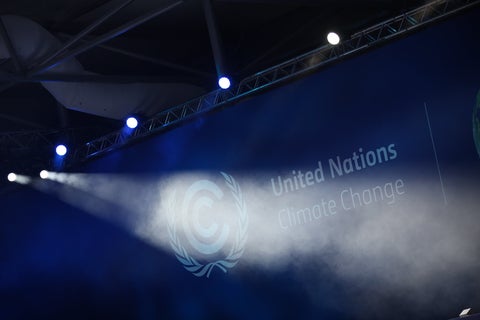The first week of COP26 has come to an end. In a single week, we heard world leaders give their statements on future national actions, discussed climate finance as a mechanism for climate change solutions, planned the transition to renewable energy, highlighted youth’s role in climate action on Youth Day and listened to the Intergovernmental Panel on Climate Change’s (IPCC’s) leading scientists explain the latest climate science. Representing the University of Waterloo at COP26 has been surreal; COP26 has been an incredible platform for experts, professionals, and leaders to come together to discuss the global issues surrounding climate change and strategize solutions. However, after each panel discussion, I couldn’t help but notice that most of the panel time was spent discussing the problem, and less time was spent discussing concrete solutions.

Photo courtesy of the United Nations Framework Convention on Climate Change (UNFCCC).
As a science student, I was particularly excited about hearing the IPCC Working Group 1 discuss the newest findings in the Sixth Assessment Report (AR6). Leading IPCC scientists summarized the report, pointed out key insights regarding the current state of the climate and possible climate futures, and discussed uncertainties in knowledge. For instance, scientists reconfirmed that global temperatures will exceed 1.5-2 °C unless deep reductions in CO2 occur. This was probably my favourite event to attend as I truly believe climate science is one of the strongest tools we have for understanding the complexities of climate change. The evidence that the IPCC authors provided were concrete and grounded in objectivity. This made for a productive conversation because authors were able to show us where, when and what was happening around the world in relation to climate change, with a level of quantified uncertainty.
I also had the chance to listen to some presentations at the World Health Organization (WHO) Health Pavilion, where conversations on climate change and health were held. With a background in epidemiology/medical science, I have always been interested in the intersection between the environment, humans, and animals. I heard several scientists and doctors speak on topics such as infectious disease increases with climate change, air pollution and health, and plant-based diets as a key solution to climate change and health issues. Health risks in Canada are rapidly increasing due to climate change; whether it be harmful air pollution after wildfires or increases in Lyme disease transmission. Speakers at the WHO Health Pavilion presented some key solutions that are easily transferable to the Canadian health system such as development of early warning systems, inclusion of health risks in environmental policies, and fossil fuel reductions.
On Youth Day, young activists took the streets to vocalize their demand for climate action. At the conference, I heard several youth leaders speak about their climate-related experiences and projects. However, almost all young leaders felt left out of the climate action decision making process and demanded a seat at the table. Lowering the voting age in some countries or securing free education were other interesting proposals to support youth action.
At the start of this post, I mentioned how most of the time at COP26 was spent discussing the problem and not the solution. Perhaps it is because the real solutions arise after the COP when everyone returns home to their countries with new knowledge. From world leaders to Indigenous youth leaders, everyone has a role to play in solving this problem. World leaders and governments must fulfill the promises made in Paris in 2015. Universities, like the University of Waterloo, must support the next generation of climate finance experts and scientists. Industry and youth must create innovative solutions, renewable energies, and clean technologies. Indigenous people must continue to guide environmental governance. And we must all nurture and care for the one, beautiful planet we have.

Misha Patel is a Masters of Climate Change student at the University of Waterloo and attended the 26th Session of the Conference of the Parties (COP26) United Nations Climate Change Conference in Glasgow, U.K. during fall 2021. This is her final reflection from participating as a student delegate at the conference.